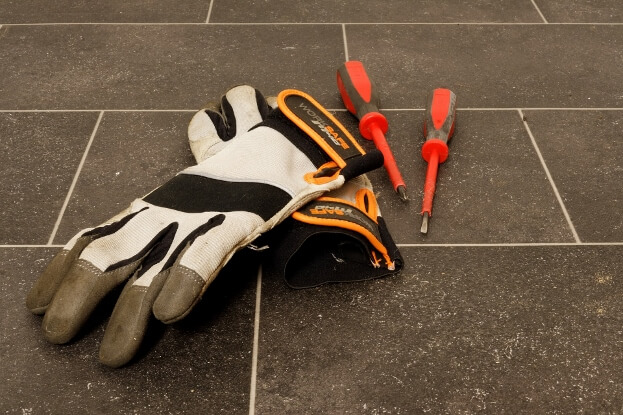Whether you are doing some maintenance around the house, completing larger repair jobs or building something new, there are risks associated with DIY. There are some basic safety measures you can take, however, that will make your DIY tasks less risky as well as more enjoyable and productive. Here are our top five:
First aid
Even the most basic DIY tasks can end in injury – every year, people cut themselves, stab themselves or fall off a ladder all in the name of home repairs, and these are just the more minor injuries. Keep a well stocked first-aid kit handy, and make sure it is appropriately stocked with gauze, bandages, plasters and antiseptics. If in doubt, or for more major issues, do your best with the first aid kit and then get yourself to the hospital or doctor’s surgery.
Ladders
On the subject of people falling from ladders, following some basic ladder safety rules can greatly reduce the risk of a fall. Before you even set foot on your ladder:
- Make sure the base of the ladder is on a stable and secure surface
- For stepladders, make sure the arms and/or platform are locked open
- Make sure each rung or tread is clean, dry and undamaged
Once you are sure the ladder is in good condition and correctly positioned, you can start work. But remember:
- Keep three points of contact at all times (two feet and a hand on the ladder)
- Never over-reach/stretch
- Adhere to weight capacity limits
- Make sure you aren’t leaning the ladder against glass (windows, for example) or flexible surfaces like guttering
- Never stand on the top rungs or on the platform of your ladder
Mask up
Sanding, drilling, sawing and a broad range of other DIY tasks can fill the air with particulates and dust that will impair your breathing. You can wear a simple mask to reduce the impact or, if you are working with chemicals/harsher substances, you might want to invest in a more robust respirator.
Don’t neglect eye protection either – dust in the eye can be more than just a nuisance, you can scratch your retina or even get a nasty infection, so make sure to wear safety goggles and keep some eye wash solution in your first aid kit.
Power down
Check and double-check that you have turned off the power when working on anything electrical (lights, sockets, etc). Turn off switches or the main circuit at the breaker board, and ensure that anyone else in the premises knows what you are up to and does not come along and turn it back on without you knowing.
Be aware
Always have a good awareness of your environment and your surroundings. If you are working behind a door make sure that anybody else in the property knows you are there, or that the door is locked. Similarly, if you are working on gas or water, make sure everyone knows not to turn on taps as, when you make the system live again, you will be inadvertently venting gas or water into your property and might not realise until it is too late.








![Avast Driver Updater Key 2022 | Activation Key V2.5.9 [Free]- Avast Driver Updater Key 2021](https://vintank.com/wp-content/uploads/2021/02/Avast-Driver-Updater-Key-2021-100x70.jpg)
![Avast Premier Activation Code and License Key [Working] Avast Premier Activation Code and License Key](https://vintank.com/wp-content/uploads/2021/09/Avast-Premier-Activation-Code-and-License-Key-100x70.jpg)
